A resume is an important document that presents your professional background and skills to a potential employer. It has to be well-written, up-to-date, informative, yet concise.
One of the questions many people have while writing a resume is "How long should a resume be?". The answer depends on several factors, such as your employment history and the type of job.
In this article, we will find out how to pick the optimal length of your resume.
How long can a resume be?
I want to have a resume that is substantial enough to hold itself as respectful.
The reply to this question is simple: as long as it needs to be. Recruiters and hiring managers often prefer short resumes. However, if you have outstanding skills and experience that don't all fit on one page, you can surpass the limit.
- A resume should have your contact info, an overview of your education, a summary of your experience, details of your relevant skills, and a list of accomplishments. Depending on your background, this could take up one page or more.
- Ensuring that the information included is appropriate to the position is paramount. Don't waste space with unnecessary words or irrelevant expertise. Focus on the details that are valuable for the role you are applying for.
- If you have years of experience in the field with various companies, highlight the most important and relevant information first. If you don't have a lot of experience, it is okay to include all the positions held on the resume.
- In some cases, it is acceptable to provide additional information in an accompanying cover letter or portfolio. This can help provide more context around why you are the right candidate for the job.
- Avoid clutter by eliminating outdated roles or irrelevant achievements—prioritize recent, high-impact contributions that align with the requirements.
Create your professional Resume in 10 minutes for FREE
Build My Resume
What are the resume length variations?
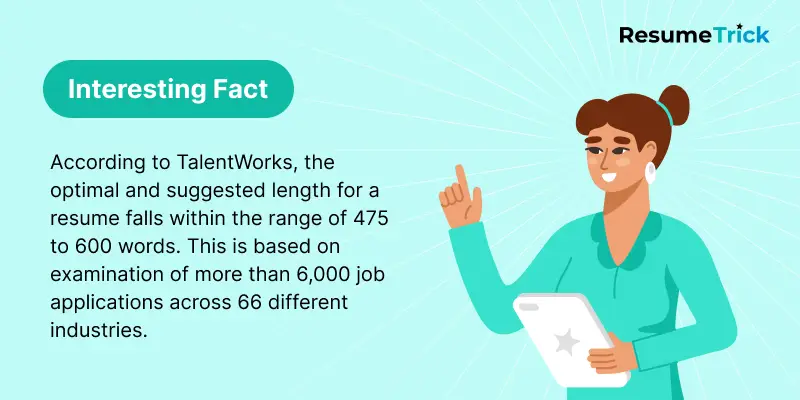
How much information should you include? How many pages should a resume be? It's important to strike the right balance between providing enough detail and the adequate length of a resume.
- Recent graduates and entry-level specialists usually have a short resume. It's brief and emphasizes your qualifications, schooling, and experience that are appropriate for the position you're seeking.
- If you have several years of experience, it might fit on one page but is also appropriate to be a two-page resume. Include only the particulars necessary to demonstrate your key talents.
- Those with a long work history or professionals in academics may consider a three-page resume. This provides space to incorporate publications or awards and emphasizes successes in greater depth.
- Career changers may benefit from a hybrid format, which can span one to two pages and highlights transferable skills while minimizing unrelated job history.
Remember, the goal is to create a clear and concise document that reflects your achievements. Quality should always take priority over quantity when making a resume.
How to write a one-page resume?
A concise and short resume is a great way to make sure your most relevant professional experience is highlighted. It also ensures that HRs don't become inundated with an excessive amount of information.
When building your one-page resume, focus on displaying your:
- Professional summary;
- Core competencies;
- Education;
- Certifications;
- Substantial professional background;
- Key accomplishments quantified with metrics or outcomes.
It is imperative to keep your resume sections organized, utilizing bullet points to highlight key accomplishments and skills. Avoiding overly long descriptions of past jobs or experiences can help keep your resume to one page.
In what case should your resume be one page?
If you are just beginning your career and lack in-depth experience, or applying for an entry-level position, stick to one page. You don't want to overwhelm HR with too much irrelevant information.
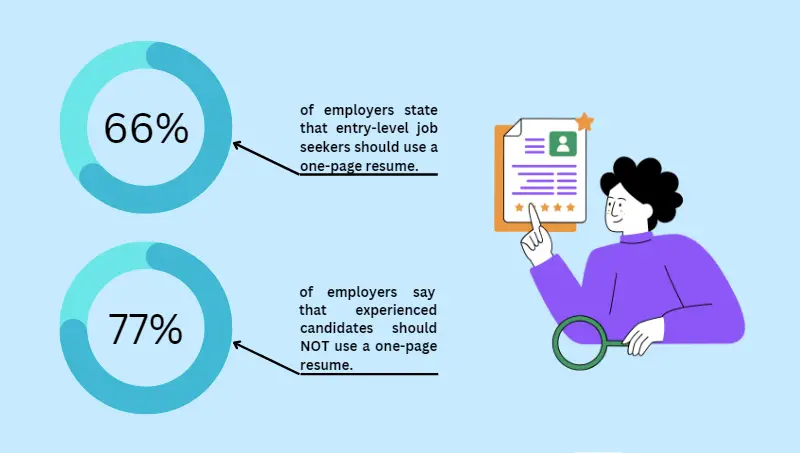
Generally speaking, most resumes should be limited to one page as recruiters don't have time to read many long resumes. They want a quick overview, not an autobiography. If you're having difficulty keeping it brief, practice some editing by removing any unnecessary details or descriptions that don't add value to your application.
Pros of using a short resume:
- Employers usually only spend just a few seconds reviewing each resume. A single page secures them to get the key information they need quickly.
- Recruiters are becoming increasingly busy and often have to review hundreds of resumes. Stating your qualifications succinctly makes it more likely that they will read it through.
- A single-page resume demonstrates an important skill for any job – the ability to communicate effectively in a limited space.
Create your professional Resume in 10 minutes for FREE
Build My Resume
One-page resume examples
One-page resume sample | Plain text
Desiree E. Prado
Madison, WI
Email: desiree.prado@gmail.com
Phone: (784) 874-3244Summary
Dedicated and detail-oriented Criminal Law Paralegal with over 7 years of experience supporting attorneys in various aspects of criminal defense and prosecution. Proficient in legal research, case management, and document preparation, with a strong understanding of criminal procedures and courtroom protocols. Committed to advocating for clients' rights and ensuring that all legal processes are followed meticulously.
Core Competencies
- Criminal Law Knowledge
- Legal Research & Writing
- Case Management
- Client Communication
- Document Preparation
- Trial Preparation
- Evidence Collection
- Legal Terminology
Experience
Criminal Law Paralegal
Anderson & Smith Law Office, Madison, WI
March 2020 – Present
- Provide comprehensive support to criminal defense attorneys in managing a diverse caseload of felony and misdemeanor cases.
- Conduct legal research and prepare legal documents, including motions, briefs, and discovery requests.
- Assist in trial preparation by organizing evidence, preparing exhibits, and coordinating witness interviews.
- Communicate effectively with clients, keeping them informed of case developments and addressing their concerns.
Legal Assistant
Johnson & Associates, Madison, WI
January 2018 – February 2020
- Supported a team of attorneys in various legal matters, including criminal defense and civil litigation.
- Managed case files and maintained organized documentation for ongoing criminal cases.
- Conducted initial client intakes and gathered relevant information for case files.
- Assisted in drafting correspondence and maintaining schedules for court appearances and meetings.
Education
Bachelor of Arts in Criminal Justice
University of Wisconsin-Madison, WI
Graduated: May 2017
Certifications
- Certified Paralegal (CP), 2022
- Legal Research and Writing Certificate, 2021
Technical Skills
- Westlaw and LexisNexis
- Microsoft Office Suite (Word, Excel, PowerPoint)
- Case Management Software (Clio, MyCase)
References
Available upon request.
Can a resume be two pages?
Most experts agree that two-page resumes are acceptable for experienced professionals. Such length provides the opportunity to include more detail that can make the candidate stand out. However, you should only include the essential and pertinent information.
- Make sure to use a clear font size, such as 11 or 12 points, so that employers can easily read your resume.
- You should also use headings and points to facilitate skimming.
- Refrain from including superfluous specifics such as information about high school experiences.
When to use two pages?
With a decade or more of work experience, the resume should encompass two pages. This is because you should provide a comprehensive overview of your past work history, and qualifications.
If you have worked for many different employers, you will need to put this information on two pages. This will help recruiters answer the most common questions about where you worked in the past.
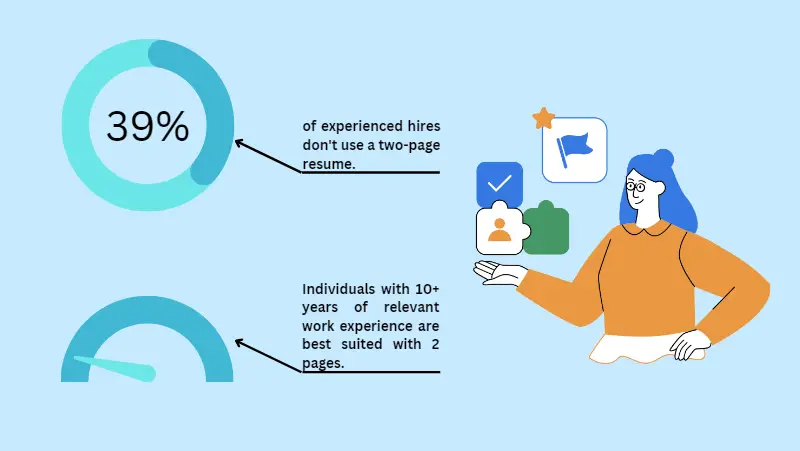
If you are unsure whether your resume should be one or two pages, ask someone to review it for you. You can also look at resume examples online for inspiration on how to structure your own resume.
Why write a two-page resume?
- You need enough room to include all of your relevant information. You won't be able to fit all the features you need in a one-page resume.
- A two-page resume allows you to highlight your achievements and give more context to your experiences.
- Writing concisely and effectively demonstrates your ability to convey information in a clear and articulate manner.
- A longer resume is more visually appealing. You can break up the text with headings and bullets, making it easier for employers to skim through quickly.
- It gives you more opportunities to illustrate your personality and creativity. You can include descriptions of personal projects that demonstrate your eagerness for the job.
Your resume doesn't have to take up two full pages. Just be sure to provide enough details to showcase your skills and experiences.
In short, a two-page resume guarantees that all essential points are included and offers employers a better overall picture of your qualifications. So don't worry about letting your resume run over one page. This is the place to shine in order to convince the employer - you're the right candidate!
Two-page resume examples
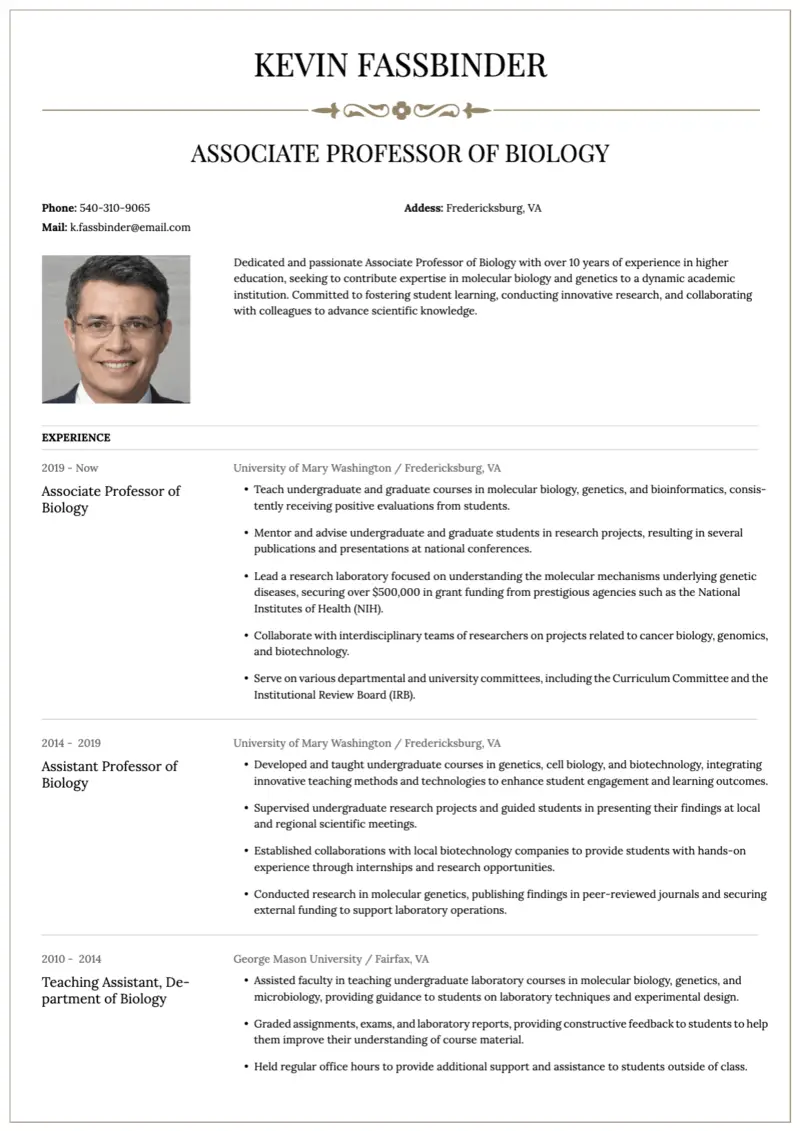
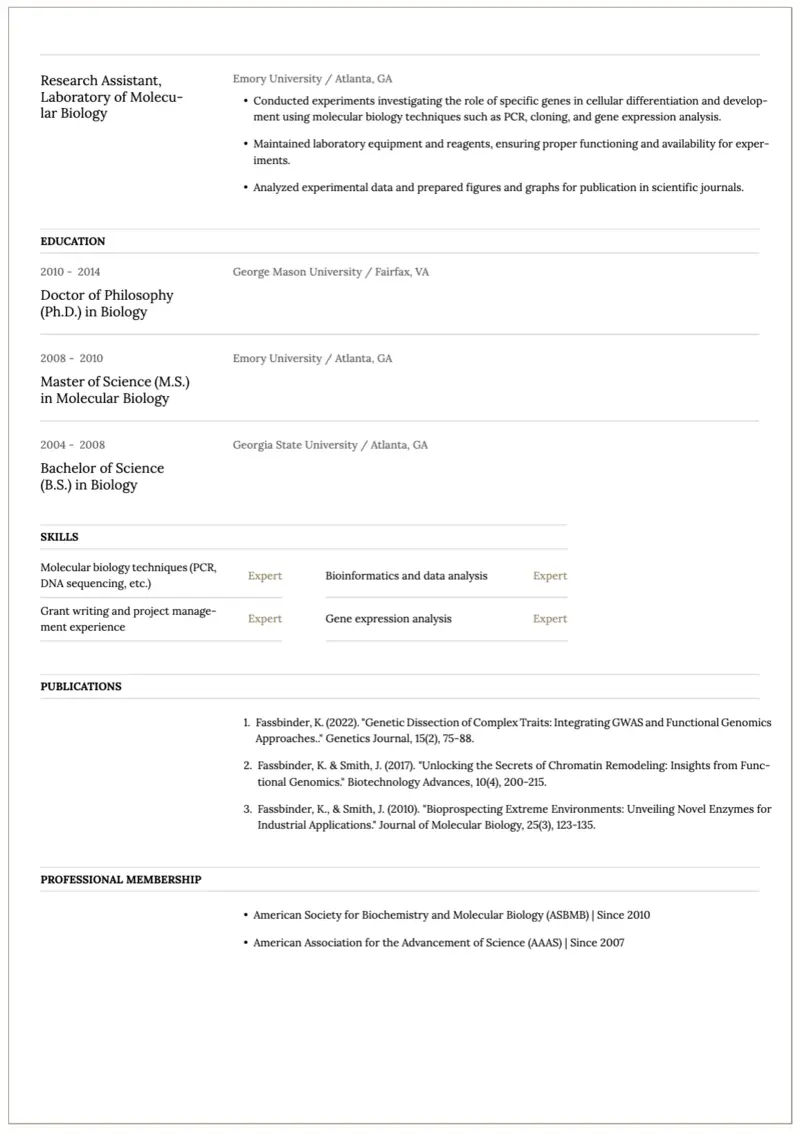
Can I have a three-page resume?
A long resume allows job seekers to offer further insight and elaboration in regard to their experience and qualifications. It also permits them to give extra information about their achievements. This can be especially helpful when applying for senior-level positions or advancing your career in academia.
Yet, there exist some essential guidelines to remember when writing a resume in general and constructing a three-page resume:
- Prioritize quality instead of quantity. Focus on the most relevant details about your professional history and qualifications.
- Be concise. Don't use long sentences and use bullet points whenever possible.
- Avoid unnecessary information. Don't include irrelevant work experience or other non-essential elements.
- Keep the formatting uniform. Make sure your font size, margins, and spacing are all consistent throughout the document.
Note: If your resume is for academic purposes and is longer than three pages, you should consider writing a CV instead.
Create your professional CV in 10 minutes for FREE
Build My CV
When can you use a long resume?
There are certain cases when a three-page resume can be appropriate:
- If you have worked in a variety of positions and different industries, a third page can ensure that all these experiences are included.
- A third page may also be necessary if your job history includes many accomplishments or if you have a long list of awards or certifications relevant to the occupation.
However, it is important to note that an overly lengthy resume can work against you.
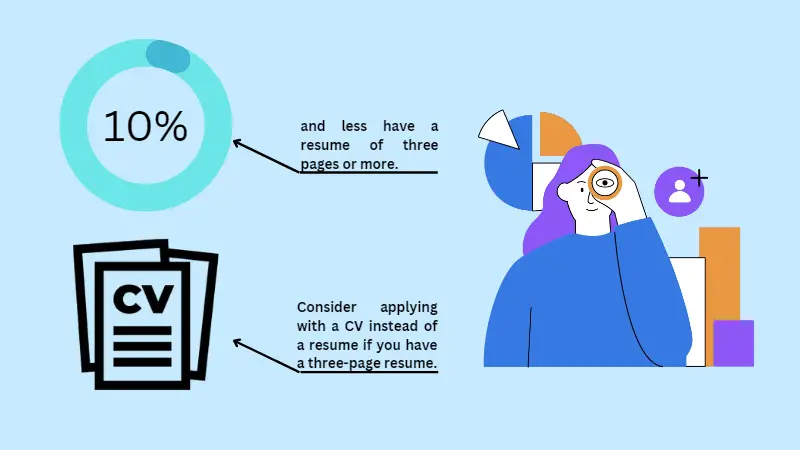
When it is appropriate to have a three-page resume?
The most common advice you'll hear is that a resume should be one page. However, for some professionals, this isn't enough. A longer resume provides more space to reveal your achievements and unique talents.
Reasons to make your resume three pages long:
- You have plenty of areas to clarify your past job tasks.
- It's easier to demonstrate your performance. Listing milestones and achievements on a detailed resume is much easier than trying to cram them into a single-page document.
- You can order more references. A three-page resume offers you the scope to add additional recommendations.
- It demonstrates that you are committed to your professional development. A longer resume shows that you take your career seriously and are willing to put in the time and effort to make sure that employers see your full potential.
Resume length for different spheres
Various industries often prioritize different aspects of a candidate's background and experience. Therefore, it's essential to customize your resume to align with the expectations of the professional field you're targeting.
Here's how resume expectations can vary across industries:
| Professions | Characteristics | Length | Examples of Professions |
|---|---|---|---|
| Academia and Research | CVs (curriculum vitae) are more common than resumes as they detail academic achievements, publications, research projects, teaching experience, and conference presentations. | Due to the need for a comprehensive overview, CVs can extend beyond two pages. | Teachers, University Professors, Researchers, Scientists |
| Creative Industries | Emphasis on creativity and visual presentation. Resumes may include portfolios showcasing work. | Flexibility in length to highlight creative projects and achievements effectively. | Graphic Designers, Advertising Executives, Content Creators |
| Technical Roles | Prioritization of technical skills and certifications. Detailed sections on programming languages, software proficiency, project experience, and technical certifications. | Resumes may extend beyond the traditional one or two-page limit. | Engineers, IT Specialists, Software Developers |
| Business and Finance | Concise resumes focusing on quantifiable achievements, leadership experience, and measurable impacts on business outcomes. | Emphasis on relevance and impact to keep resumes concise and impactful. | Financial Analysts, Business Consultants, Marketing Managers |
| Healthcare and Medicine | Highlighting clinical experience, patient care skills, research publications, and certifications. | Resumes may vary in length based on the depth of experience and qualifications in specialized roles. | Doctors, Nurses, Medical Researchers |
| Nonprofit and Government | Emphasis on community service, volunteer work, and public sector experience. | While two pages are generally acceptable, resumes should showcase commitment to social impact and relevant skills and experiences for nonprofit and government roles. | Social Workers, Government Administrators, NGO Program Managers |
Understanding the norms and expectations of your professional industry enables you to tailor your resume effectively. By highlighting relevant skills, experiences, and achievements, you increase your chances of making a positive impression on potential employers.
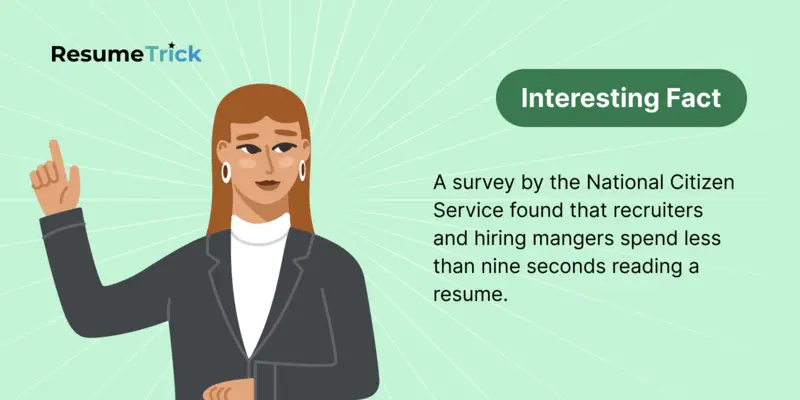
How long should a student resume be?
As a student or recent graduate, you may be wondering what is the best size for your resume. Does a student resume have to be one page? The answer is that it depends on your experience, goals, and the position for which you are applying.
A student's resume should typically be one page in length, especially if they have limited work experience.
Here's why:
- Conciseness. One page forces students to be concise and focus on the most relevant information. Recruiters often appreciate resumes that get straight to the point without unnecessary fluff.
- Attention Span. HR often has limited time to review each resume, so a one-page format ensures that they can quickly scan the document and grasp the key points.
- Emphasis on Achievements. With limited work experience, students should prioritize showcasing their achievements, skills, internships, projects, and relevant coursework. Keeping the resume to one page encourages students to highlight their most significant accomplishments effectively.
- Professionalism. Presenting a well-organized and succinct one-page resume demonstrates professionalism and attention to detail, qualities that are highly valued by employers.
- Adherence to Standards In many industries, especially entry-level positions, a one-page resume is the standard expectation. Deviating from this norm without sufficient experience or qualifications might raise concerns about the candidate's ability to follow conventions.
However, there can be exceptions. If a student has extensive relevant experience, multiple internships or volunteering contributions, or significant achievements to showcase, they might consider extending their resume to two pages. In such cases, it's crucial to ensure that all information provided is relevant, impactful, and well-organized.
To ensure your resume size is right, begin by enumerating all of your pertinent activities and successes. Then, highlight the most impressive and pertinent to the desired job.
For your convenience, you can use our resume templates. They can aid you in tailoring your resume while still emphasizing your strongest abilities.
Write a resume nowWhat are the resume length tips?
- Prioritize Content. Regardless of length, prioritize the most relevant and impactful information. Place the most important sections, such as work experience and skills, towards the top of the resume where they're most likely to be noticed.
- Quantify Achievements. Focus on quantifiable achievements rather than listing job duties. This helps to demonstrate your contributions and the tangible results you've achieved in previous roles, making your resume more compelling regardless of its length.
- Use Concise Language. Be concise and to the point in your descriptions. Use action verbs in resume and bullet points to convey information efficiently. Avoid lengthy paragraphs that may lose the reader's interest.
- Consider Visual Appeal. If extending to two pages, ensure the layout is visually appealing and easy to read. Use appropriate spacing, font sizes, and formatting to maintain a professional appearance. Visual elements like bold headings and bullet points can help organize information effectively.
- Review and Edit. Regularly update your resume and edit it to keep it concise and up-to-date. Remove outdated or irrelevant information, and streamline content to highlight the most recent and relevant experiences.
- Seek Feedback. Get feedback from peers, mentors, or professional resume reviewers to ensure your resume effectively communicates your qualifications. They can provide insights on what information to include or exclude based on the targeted job and industry norms.
By considering these tips, you can determine the appropriate length for your resume and ensure it effectively showcases your qualifications to potential employers.
FAQ
- Are there specific industries or professions where longer resumes are preferred?
- In academia, research positions, or executive roles, longer resumes are often preferred to showcase extensive experience and qualifications. Industries with complex technical requirements, such as engineering or IT, may also warrant longer resumes to detail specialized skills and projects.
- What factors should I consider when deciding the length of my resume?
- Consider relevance, quality, and brevity. Focus on including information directly related to the job you're applying for. Prioritize recent and significant experiences, achievements, and skills that demonstrate your suitability for the position.
- Will a longer resume with more detail increase my chances of getting noticed by employers?
- While a longer resume may provide more detail, it's crucial to maintain the reader's interest and avoid overwhelming them with irrelevant information. Focus on conciseness, clarity, and impactful content. Use bullet points, concise language, and strategic formatting to streamline your resume without sacrificing substance.
- Are there any formatting techniques I can use to reduce the length of my resume without sacrificing content?
- Employ formatting techniques such as reducing margins, adjusting font size, and utilizing concise bullet points to condense content. Eliminate redundancy and prioritize information that aligns closely with the job requirements. Consider using a combination of summary sections, skill highlights, and achievement-based bullet points to convey essential details efficiently.
- What impact does resume length have on applicant tracking systems (ATS) and online job applications?
- Resume length can impact how applicant tracking systems (ATS) parse and assess your application. While some ATS platforms may have character or page limits, others may prioritize content relevance over length. To optimize for ATS, ensure your resume includes relevant keywords, uses standard fonts and formatting, and avoids excessive use of graphics or tables that may not be parsed accurately.
- Is it better to cut out certifications or keep them on a longer resume?
- This depends on their relevance. Prioritize certifications that are directly aligned with the role or industry. If they’re outdated or unrelated, it’s better to exclude them and save space for more pertinent information.
- Can I use links to keep the resume shorter?
- Yes, using hyperlinks to online portfolios, LinkedIn profiles, or published work is a great way to include additional information without crowding the resume. Make sure the links are active and direct readers to professional content.
- Is it acceptable to add an appendix or addendum to a resume?
- In some cases, yes. For academic CVs or technical roles, you can include an appendix with publications, projects, or certifications to keep the main paper concise while providing these details separately.
Conclusion
The size of a resume matters. Too short and you may not capture all your relevant experience, too long and you lose the reader's interest. So, how long should a resume be?
For the majority of those searching for employment, between one and two pages is the ideal resume length. This allows you to provide a brief overview of your experience and qualifications without overwhelming the reader.
However, it's important to remember that every job seeker's situation is unique. If you have a deep understanding or need to include additional information about your background, you may use more than two pages for your resume.













